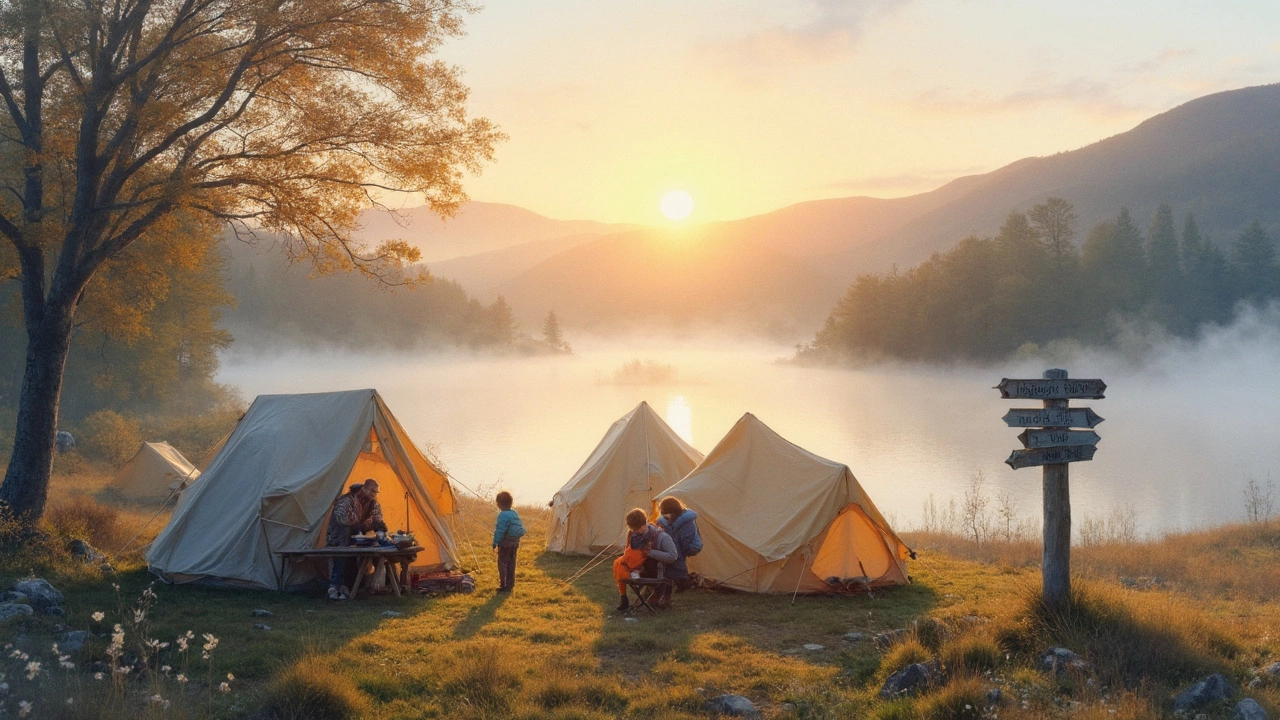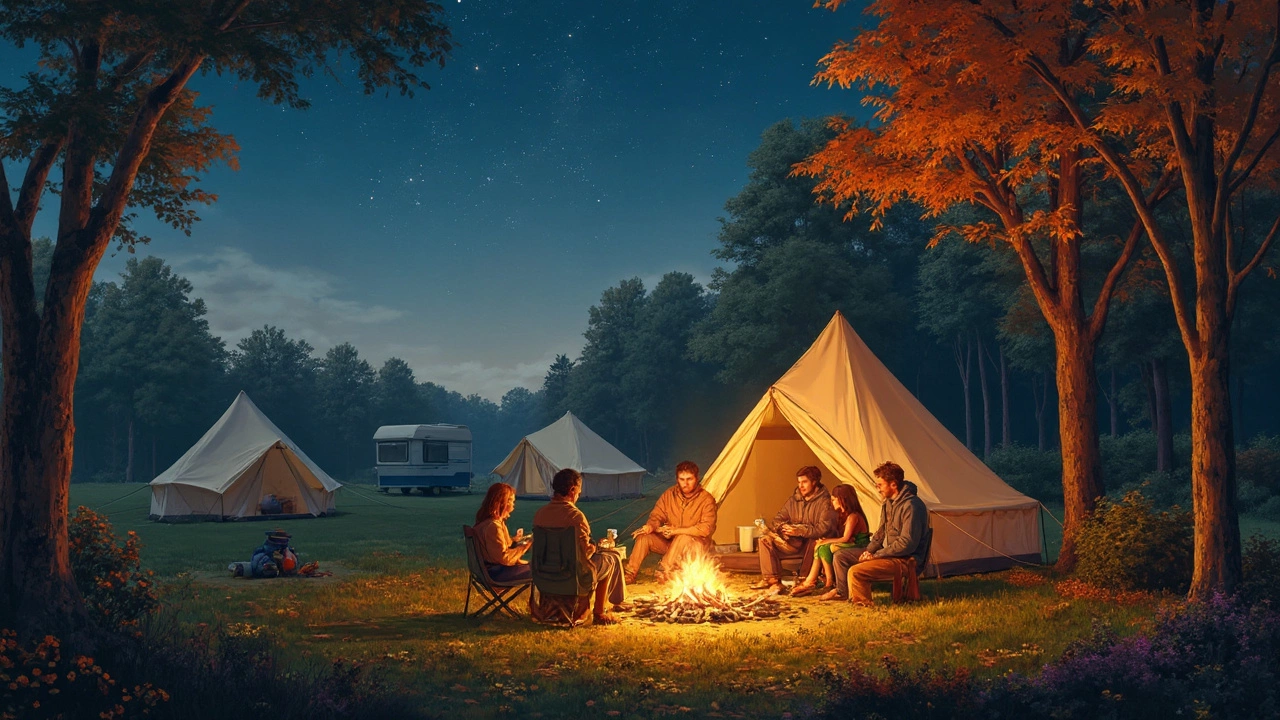So, you're pondering the idea of ditching the traditional home and settling into a campground. Sounds dreamy, right? Waking up to birds chirping, stepping outside to trees swaying in the breeze, and sipping your morning coffee with a view of the mountains. But it's not all campfires and s'mores when you consider living there all year.
First off, think about the basics like electricity, water, and internet. Many campsites offer these amenities, but can you rely on them 24/7? What about garbage disposal or getting mail? It's crucial to check if your chosen spot can provide these essentials, especially through winter months when conditions can get harsh.
Weather is a biggie. Sure, summer days are glorious, but winter offers its own set of challenges. Are you ready for possibly freezing temperatures in a less insulated setup than a regular house? The romantic idea of a snowy landscape might turn into a test of endurance if you're not fully prepared.
- The Appeal of Living at a Campground
- Practical Considerations
- Legalities and Restrictions
- Creature Comforts
- Community Dynamics
- Financial Aspects
The Appeal of Living at a Campground
Ever thought about trading the hustle and bustle of city life for the tranquil simplicity of campground living? For some, it's the ultimate dream of being in touch with nature, almost like having an extended retreat without the back-and-forth hassle. Imagine stepping out of your tent or RV into a natural wonderland every morning. It's like living in the heart of your favorite hiking trail.
One of the biggest perks is the cost-saving aspect. Forget sprawling utility bills or rent; at many family campsites, a month’s stay could be just a fraction of a typical apartment rent in the city. It’s a budget-friendly way to live comfortably without the financial stress of homeownership or leasing in overpriced urban areas.
Community is another unexpected bonus. Campgrounds often have a friendly vibe, almost like an old-school neighborhood. You get to know your 'neighbors' pretty quickly. Whether it's sharing a bonfire or helping someone set up their tent, there's a sense of camaraderie that's hard to find elsewhere.
For those steering clear of long commutes and traffic, calling a campground home offers a chance to slow down and appreciate life. It's not just the views; it's the lifestyle. You can split wood for campfires instead of fighting with spreadsheets, or maybe you trade shopping malls for scenic trails. Besides, if you work remotely, isn't it better to do it with an awesome backdrop?
There's also the health angle. Spending more time outdoors can lead to reduced stress levels, better physical health, and increased happiness. Pretty neat trade-off for giving up that cramped apartment, huh?
While the idea of living in a campground year-round might not fit everyone's lifestyle, for nature lovers and those seeking a more minimalist, mindful existence, it sure offers a lot to think about.
Practical Considerations
While living at a campground year-round can be an exciting adventure, it requires some serious planning. Let’s break down a few practical things you need to think about before packing up your entire life and moving into your tent or RV.
First, think weather. The charm of outdoor living might wear thin if you're not prepared for seasonal changes. In cold climates, ensuring your RV or tent is winter-ready can save you from shivering nights. Consider insulated options or extra heating equipment. In hot weather, air conditioning could become a must-have, unless you're keen on midday siestas to beat the heat.
Next, let’s talk about the logistics of a year-round setup. You'll need a reliable source of electricity. Check if the campground offers hookups or if you need to invest in solar panels or generators. The internet might not feel vital at first, but maintaining connections for work or just keeping up with Netflix can be crucial for long-term comfort. Look into mobile hotspots as a backup solution if campsite Wi-Fi isn’t dependable.
Water supply is another biggie. Having a persistent, clean water source is a non-negotiable. Find out if the campground can furnish this throughout the year or if you'll need to arrange water storage solutions. Similarly, waste disposal is not exactly the most glamorous topic, but a necessary one. Be sure that you have access to regular trash removal services or that you've got a manageable waste plan in place.
Finally, think about the unexpected. What if the campground suddenly raises fees or changes its rules? It's smart to have a backup plan or even a secondary location in mind. Flexibility will keep you from scrambling if circumstances change.
By preparing for these practical considerations now, you’re setting the foundation for a smooth transition into your delightful year-round camping life. It’s about being ready for every eventuality, not being caught off guard by what Mother Nature or campground policies might throw your way.
Legalities and Restrictions
Before you pack your bags and head for the nearest campground to settle down, there are some legal hoops to jump through. Campsites have rules, and some places are stricter than others when it comes to living there full-time. Think of it like trying to move into a friend’s garage—they might love having you there, but the neighborhood association could say otherwise.
First up, some campgrounds just don't allow year-round camping. They might have maximum stay limits, like 14 or 21 days, and then require you to skedaddle for a while before you can hop back in. This is mainly because these spots are designed for recreation, not permanent living.
Then there’s zoning laws. These vary from place to place, but residential zoning can sometimes prohibit continuously living in what’s considered a temporary accommodation. Without the proper board approval or an exception, you might find out the hard way with a notice slapped on your camper door.
If you’re eyeing a specific campground, always check local and site-specific regulations. Some even have seasonal closures. And let’s not forget about mail services. Most campsite addresses won’t cut it for getting important documents delivered. So, you might need a workaround, like a P.O. box in the nearest town.
Also, some campsites require residents to have a permanent home address elsewhere. It sounds backward, but it’s mainly for their records and to dodge any legal issues.
All these can be a bit hassle-like, but understanding campground living constraints helps you avoid fines or, worse, eviction from your slice of heaven.

Creature Comforts
When you're thinking about campground living year-round, having some creature comforts is crucial. Imagine heading to the showers and finding lukewarm water—that's not the most pleasant way to start your day. Many campsites offer hot water, but always check how reliable it is, especially if you're in a remote area.
If you're planning to cook up a storm, find out about the cooking facilities. Some places boast a communal kitchen, while others might leave it to you to set up a personal camping stove. And don’t underestimate the value of a fridge or freezer, particularly if grocery runs aren't a daily affair. It's the little things like keeping your milk cold or ice cream frozen that can make a big difference.
Now, when it comes to restrooms, not all campsites are created equal. You'll find everything from plush restroom facilities to the good ol' portable loos. It's worth asking around or checking reviews to know what to expect. Year-round camping means braving different kinds of weather, and nothing beats the comfort of a proper bathroom when it's pouring outside.
A good internet connection is increasingly becoming a must-have. Whether you're working remotely, checking the weather, or streaming your favorite show, reliable Wi-Fi can be a dealbreaker. Check if the site offers it or if you'd need a trusty portable hotspot to stay connected.
Here's a handy table to give you an idea of what some common campsite amenities might include:
| Amenity | Availability |
|---|---|
| Hot Water | Available in most established sites |
| Cooking Facilities | Varies from communal kitchens to none |
| Restrooms | Ranges from permanent structures to portables |
| Wi-Fi | Offered at some sites, otherwise use hotspots |
Lastly, think about heating and cooling. Many campervans and RVs come equipped with heaters but not always air conditioning. Consider portable fans or heaters if they're not available. Keeping comfortable in all seasons makes a huge difference to enjoying campground living.
Community Dynamics
Moving into a campground full-time means embracing a unique social scene. Forget your regular neighborhood dynamics; campground living offers something a bit different. It's like having a block party every day where your neighbors are not just people, but fellow adventurers. The friendships you form in such environments can be tight-knit since everyone shares common interests in nature and outdoor living.
Most campgrounds develop their own little ecosystems of folks who look out for each other. Whether it’s sharing a meal under the stars or helping out during unexpected weather, a sense of camaraderie tends to build up quite naturally. Some campgrounds even organize potlucks, game nights, or holiday celebrations, turning a collection of temporary shelters into a buzzing community hub.
However, just like any neighborhood, the vibe at different campgrounds can vary greatly. Some places might be teeming with kids, making them perfect for a family environment, while others might cater to the retired or solo travelers. It's all about finding a spot that fits your vibe and lifestyle preferences.
On the flip side, conflicts can arise. When living in close quarters, especially for extended periods, disagreements can crop up about noise levels, pets, or shared facilities like bathrooms or laundry rooms. But here's the thing, these challenges often turn into opportunities for honing communication and compromise skills.
Lastly, it’s not unusual for full-time campground dwellers to see folks come and go, which can be bittersweet. The upside is the constant flow of new stories, experiences, and conversations. Of course, it helps to be adaptable and welcoming to new faces frequently joining your campground living circle.
Financial Aspects
When thinking about living in a campground year-round, many assume it's a budget-friendly choice compared to traditional housing. But, how much are you really saving? The costs can add up, so it's important to get the full picture before making the plunge.
First, there's the camping fee. Most campgrounds charge a nightly, weekly, or monthly rate. Monthly rates can range from €300 to €800, depending on the location and the amenities offered. Some premium spots with all the bells and whistles might even go higher.
Then, the cost of utilities. Just like any home, you'll still need to cover electricity, water, and waste disposal. Bear in mind, not all campgrounds include these in the rate, so ask ahead to avoid surprises.
Transportation costs are another thing to think about. If you're far from town, those trips for supplies or work can get pricey. Living remotely often means more driving, which means more fuel costs.
Here’s a little nitty-gritty detail: your vehicle insurance might consider your setup as a permanent dwelling, which can impact your premiums. Always check with your provider.
There's also the question of potential income loss if you can't work remotely. While campground living can offer a peaceful refuge, longer commutes could eat into your working hours or opportunities.
A quick glance at some numbers might help:
| Expense Type | Estimated Monthly Cost (€) |
|---|---|
| Camping Fees | 300 - 800 |
| Utilities | 50 - 150 |
| Transportation | 100 - 300 |
| Miscellaneous | 100 - 200 |
So, while living at a campground might slash your housing bill, it's essential to weigh all the costs. Planning and budgeting smartly can make this adventurous lifestyle both enjoyable and sustainable.
